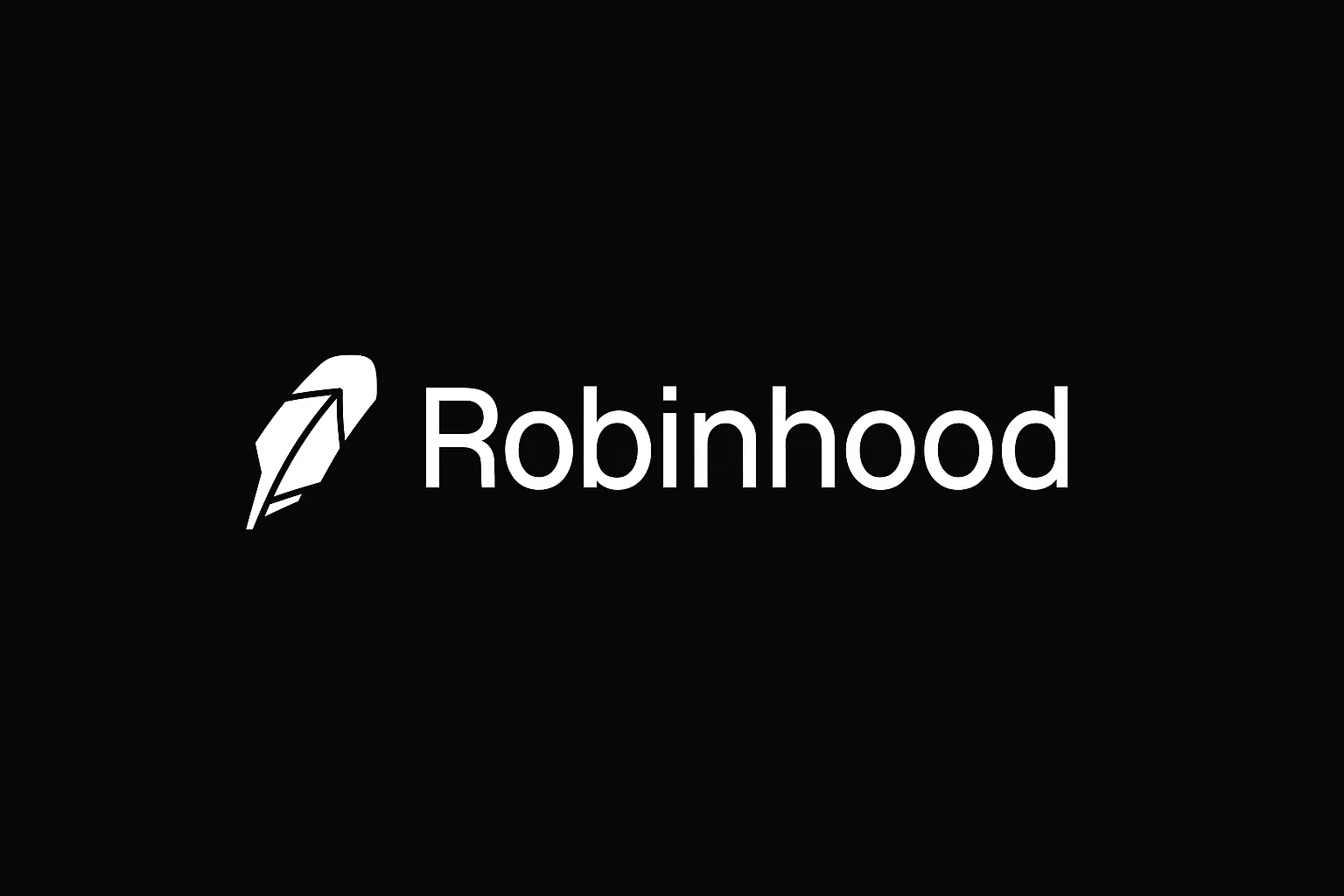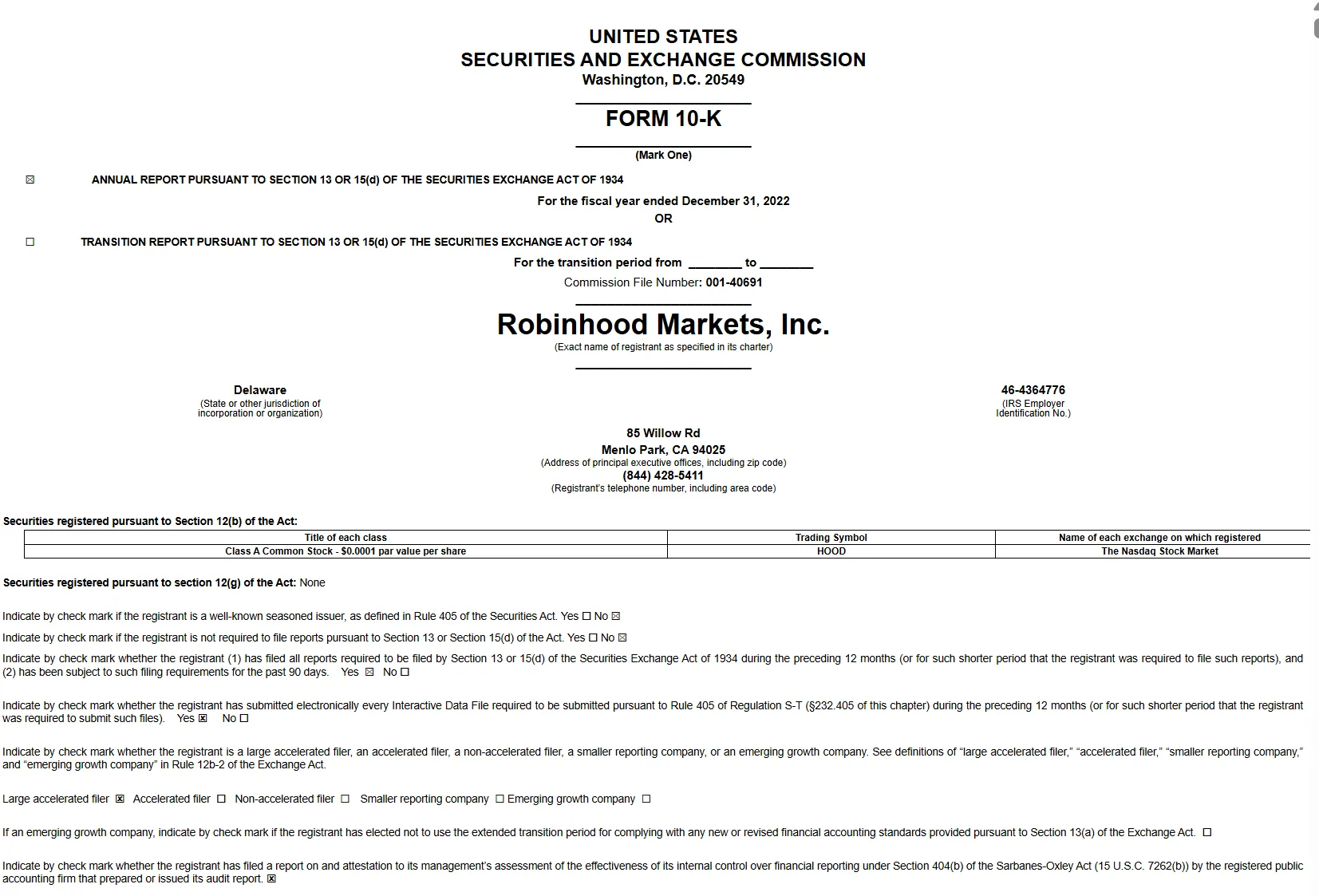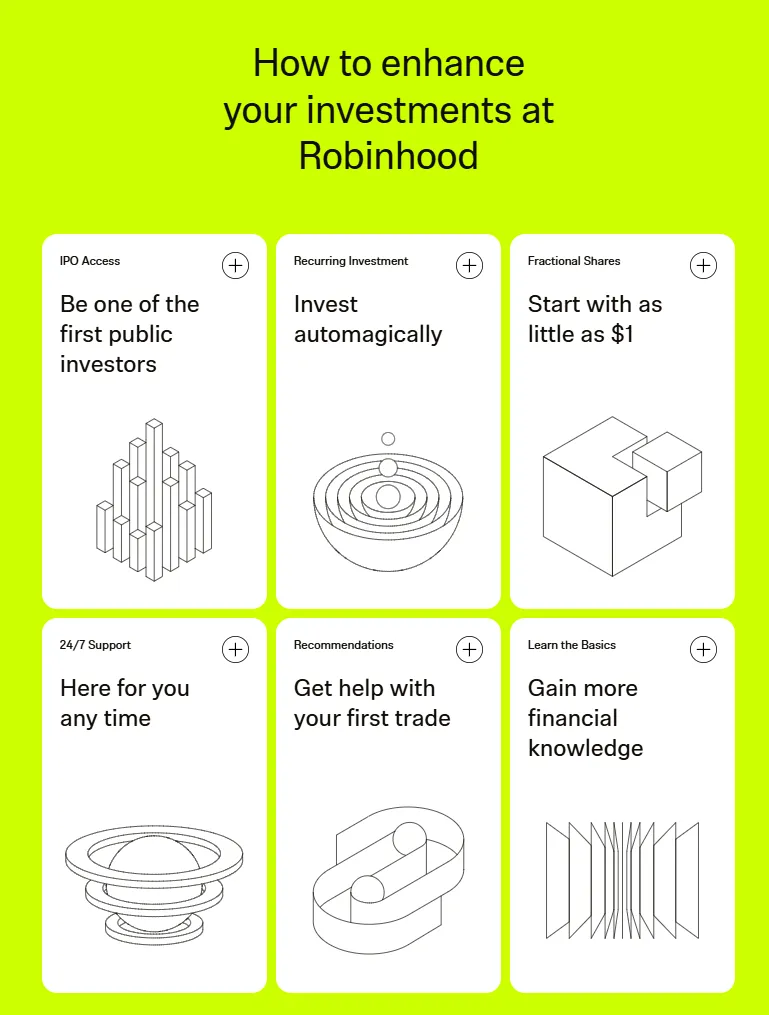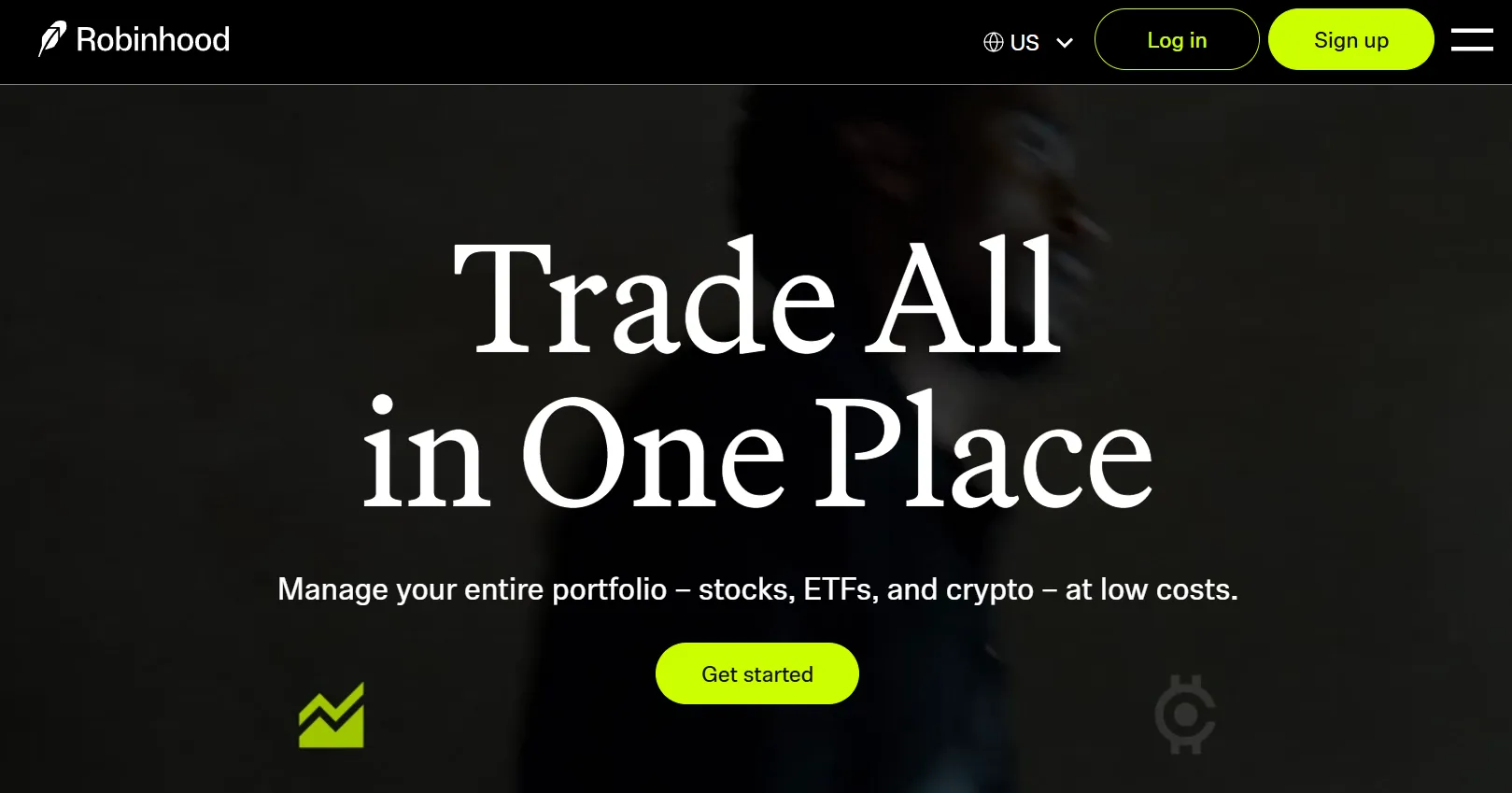 Normal Operation
Normal OperationRobinhood
20+Year
Basic Information
Country
AmericaMarket Type
foreign exchange|Stock|Futures|Crypto|CFDEnterprise Type
BrokerageService
Forex, commodities, indices, stocks, cryptocurrenciesSupport Languages
EnglishDomain Registration Date
1995-11-30Business Status
Normal OperationCompany IntroductionWeb Analytics
Company Introduction
Robinhood Markets, Inc. (Robinhood), founded in 2013 and headquartered in Menlo Park, California, went public on the Nasdaq in 2021 (ticker: HOOD). As one of the most representative zero-commission brokerages in the United States, Robinhood's "commission-free" trading model quickly expanded the market and promoted the popularization of retail investing in the United States and around the world.
The company offers users a diverse range of trading services, including stocks, ETFs, options, and cryptocurrencies. Its core business model is Payment for Order Flow (PFOF), which charges liquidity fees by routing customer orders to market makers. While this mechanism has supported the popularity of the commission-free model, it has also sparked regulatory and market debate. With its streamlined mobile trading app and accessible investment methods, Robinhood has attracted over 20 million registered users, becoming a landmark platform for retail investors in North America.
🌐 Global layout and brand background
As a publicly listed US company, Robinhood's business focuses on the US market and has yet to fully expand globally. However, its public background and recognition by the capital market provide the platform with a certain level of transparency and credibility. In terms of brand influence, Robinhood is particularly popular among young investors, particularly after the GameStop incident, when its brand became a symbol of retail investor power.
Robinhood is widely considered to have successfully captured the retail market through its mobile-first strategy and low-barrier-to-entry trading model. However, it has also drawn scrutiny due to numerous outages and controversial business models. From a long-term perspective, Robinhood's brand advantage lies in its ease of use and popularity, while its future competitiveness depends on its ability to continuously optimize its products and services amidst regulatory pressures.
💹 Trading Products and Services
Robinhood offers trading products covering US stocks, ETFs, options, and some cryptocurrencies, and supports fractional share trading, significantly lowering the barrier to entry for retail investors. Its featured service, Robinhood Gold, offers value-added features such as margin trading and research data to meet the needs of more advanced users.
External analysts generally point out that Robinhood's trading products cover the most important retail needs in the US market, but lack depth in international markets, foreign exchange, and contracts for difference. The platform is suitable for beginners and long-term investors, but its functionality remains limited for users seeking complex derivatives or multi-market exposure.
💻 Trading technology and platform experience
Robinhood's core mobile app features a simple, intuitive interface, making it popular among young investors. Its order execution relies on a payment-for-order-flow model, allowing regular users to enjoy a commission-free trading experience. However, some analysts believe this may result in less accurate transaction prices than with traditional brokerages.
In terms of user experience, Robinhood's order execution speed is approximately 50–120 milliseconds during normal testing, and overall performance is smooth. However, downtime or delays have occurred during periods of high volatility, such as the GameStop incident in 2021. Overall, the platform is suitable for lightweight investment and learning, but high-frequency traders and professional investors may have concerns about execution stability.
🛡️ Regulatory compliance and fund security
Robinhood is strictly regulated by the US Securities and Exchange Commission (SEC) and the Financial Industry Regulatory Authority (FINRA). Customer funds are also protected under the SIPC investor protection program, with up to $500,000 in account protection. As a US-listed company, its financial information is publicly available, significantly enhancing fund security and regulatory compliance.
However, Robinhood's payment for order flow (PFOF) model has long been subject to regulatory scrutiny regarding compliance, and US market regulators have also scrutinized its business model. Therefore, despite a solid compliance framework, investors should remain concerned about the potential impact of policy changes on its business model.

⚡ Trading conditions and experience
Robinhood offers commission-free stock and ETF trading, low-entry options trading, and some cryptocurrency trading, making its overall offerings highly attractive to retail investors. Its biggest advantage is that users don't have to pay traditional trading commissions.
However, trading conditions do have limitations, such as limited product coverage and reliance on market makers for order execution, which may not offer the same price accuracy and liquidity as professional brokerages. While this offers a convenient, low-cost option for retail investors, it may not be suitable for those seeking the best execution quality.

🎓 Customer Support and Value-Added Services
Robinhood offers an online help center, email, and phone support, primarily in English, with some documentation available in Spanish. Its customer service is generally rated average by the industry, but its response speed and professionalism could be improved.
In terms of value-added services, Robinhood Gold offers margin trading and Morningstar research reports. The Learning Center provides basic educational content for beginners, helping users quickly understand the fundamentals of investing. Compared to traditional large brokerages, Robinhood's educational resources and value-added features are relatively streamlined, better suited to the needs of young retail and novice investors.
⚠️ Risk Warning and Platform Positioning
Robinhood's payment-for-order-flow model creates a potential conflict of interest regarding order execution quality. Furthermore, the platform has experienced significant outages during periods of high volatility, causing inconvenience and risk to investors.
From a positioning perspective, Robinhood is more suitable for retail investors entering the market for the first time or users who want to participate in US stock trading at a low cost; however, for customers who engage in high-frequency trading, professional investment, or require complex derivatives, its functionality and stability are still insufficient.
🔍 Comprehensive analysis and evaluation
Overall, Robinhood, as a leading zero-commission brokerage in the US, has become a key choice for retail investors thanks to its strict SEC and FINRA oversight, public company background, and user-friendly mobile experience. Its strengths lie in its low barrier to entry, commission-free pricing, and simple product design. However, its weaknesses lie in its execution stability, product diversity, and regulatory controversies.
Therefore, for investors seeking easy market entry, zero commissions, and simple operations, Robinhood is a platform worth considering; however, for professional investors or high-frequency traders, they still need to carefully evaluate its execution mechanism and potential risks.
Selected Enterprise Evaluation
4.07
Total 7 commentsWhat I like most about Robinhood is the zero-commission trading — buying stocks and ETFs is super convenient… the interface is simple, and beginners can pick it up quickly. However, during high volatility, sometimes orders get delayed, which definitely needs improvement.
Reply
 ch***nn
ch***nnI’ve never felt as helpless as when the platform I invested in just disappeared. No replies to emails, no working phone numbers, and no way to access my funds. It was as if the entire company vanished into thin air. I almost gave up after weeks of trying to contact someone—anyone—who could help. Then someone online recommended Mrs. Bruce Nora. I was skeptical, but figured I had nothing to lose. From the very beginning, she stayed in touch consistently and explained what was happening behind the scenes. She knew exactly how to approach these situations and made the process feel less overwhelming. It took a bit of time, but in the end, I recovered my full balance—something I thought was impossible. If you’ve been scammed, don’t stay quiet—reach out for help. There’s still hope. bruce.nora 254 (@) gmail . com | trazevault.org
Reply
As a newcomer to investing, I think Robinhood fits me well. Fractional shares really lower the entry barrier and allow me to learn step by step… but the product coverage is limited. If you want to trade international markets or more complex derivatives, it’s not really an option.
Reply
Robinhood’s mobile app is very user-friendly, I can manage my account anywhere… but I’m a bit concerned about the Payment for Order Flow model, since execution prices may not be as transparent as traditional brokers. It’s fine for beginners, but if you’re trading professionally, you might need a more robust platform.
Reply
 ch***nn
ch***nnI’ve never felt as helpless as when the platform I invested in just disappeared. No replies to emails, no working phone numbers, and no way to access my funds. It was as if the entire company vanished into thin air. I almost gave up after weeks of trying to contact someone—anyone—who could help. Then someone online recommended Mrs. Bruce Nora. I was skeptical, but figured I had nothing to lose. From the very beginning, she stayed in touch consistently and explained what was happening behind the scenes. She knew exactly how to approach these situations and made the process feel less overwhelming. It took a bit of time, but in the end, I recovered my full balance—something I thought was impossible. If you’ve been scammed, don’t stay quiet—reach out for help. There’s still hope. bruce.nora 254 (@) gmail . com | trazevault.org
Reply
Had a bad experience regarding investing my funds here, wasn’t easy for me as I was scam severally. I lost almost all of my money until I came across a recovery expert named Barry white. He help and assisted me and helped in terms of recovery my funds . I got my funds recovered in just 4 days with just little effort. I will highly recommend Barry, he is sincere and honest in all way round he helped me got everything i lost. Contact him now if you need his help Email [email protected]
Reply
Had a bad experience regarding investing my funds here, wasn’t easy for me as I was scam severally. I lost almost all of my money until I came across a recovery expert named Barry white. He help and assisted me and helped in terms of recovery my funds . I got my funds recovered in just 4 days with just little effort. I will highly recommend Barry, he is sincere and honest in all way round he helped me got everything i lost. Contact him now if you need his help Email barrywhite4390 @ gmail. com
Reply
One has to be careful with the brokers on the internet now. Last year I was scammed in the binary trade option by a broker I met on Instagram. I invested $14000 which I lost, I couldn’t make a withdrawal and I slowly lost access to my trade account for 3 months I was frustrated and depressed. After a few months, I met Barry white who is A recovery expert that works along side with the Federal Bureau of Investigation (FBI) and other law firm. he worked me through the process of getting my money back and all the extra bonus which I got during my trading. he can be of help to anyone who has a similar situation. You can contact him via his mail: barry white4390 @gmail.com
Reply
~ There's nothing more ~
About Robinhood's questions
Ask:Is Robinhood safe and compliant?
Answer:Robinhood is a brokerage firm listed on the Nasdaq (ticker: HOOD). It is strictly regulated by the SEC (Securities and Exchange Commission) and FINRA (Financial Industry Regulatory Authority) and offers client funds protection under the SIPC investor protection program, which covers accounts up to $500,000. From a compliance perspective, Robinhood is a legal and regulated financial institution. However, its payment for order flow (PFOF) business model has been subject to controversy within US market regulation, and investors should be aware of the potential impact of policy changes.
Ask:Is trading on Robinhood really completely free?
Answer:Robinhood's core selling point is its commission-free trading of stocks and ETFs, and options trading with no traditional commissions, only regulatory fees. This makes it a very accessible platform for retail investors. However, its profit model relies on payment for order flow, which directs user orders to market makers, who then pay the fees. This can result in transaction prices that are less precise than those of professional brokerages in some cases. In other words, while trading may appear commission-free, there may be hidden costs associated with execution quality.
Ask:What type of investor is Robinhood suitable for?
Answer:Robinhood is better suited for: beginners and retail investors (low barrier to entry, user-friendly interface, and support for fractional share trading); users who want to quickly get started with US stocks, ETFs, and basic options; and young investors who value a mobile investing experience. However, it's less suitable for: high-frequency traders or professional investors (due to potential delays or poor pricing due to its order execution mechanism); and investors who require broad international market access or diversified derivatives products (its product line is limited to US markets and some cryptocurrencies).
